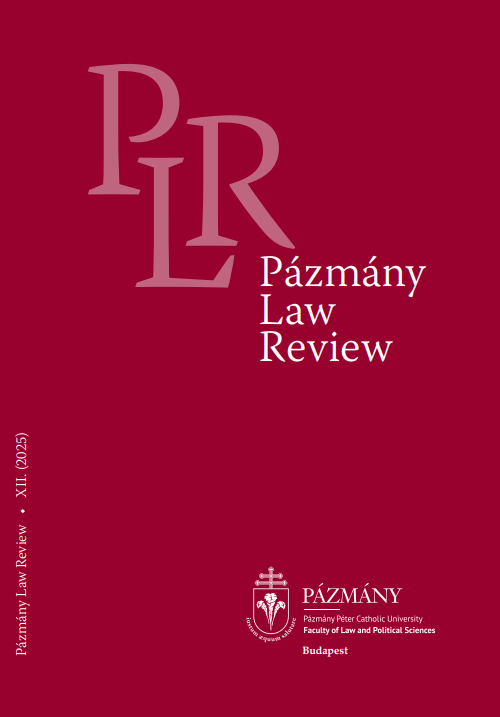Regulating the Use of AI in Civil Proceedings
Abstract
The paper addresses several current issues regarding the use of AI in civil justice. It starts from theoretical foundations and addresses the question of how we can define AI, what is the role of AI in today's civil justice system, and what challenges must be overcome when creating legal regulations. The starting point is the need for a clear regulatory framework for the use of Artificial Intelligence systems in civil justice. It presents several legislative techniques (rules granting and/or governing rights; rules establishing prohibitions; rules setting out conditions, requirements and/or obligations.) and the types of legal sources or forms of regulation that can be used in the process of legislation (self-regulation and codes of conduct; soft law; hard law). It also includes a comparative legal perspective (with Spanish and English examples).
References
Nikolaos Aletras – Dimitrios Tsarapatsanis – Daniel Preoţiuc-Pietro – Vasileios Lampos: Predicting judicial decisions of the European Court of Human Rights: a Natural Language Processing perspective. PeerJ Computer Science, 2:e93. (2016), available at: https://doi.org/10.7717/peerj-cs.93
Woodrow Barfield: The Cambridge Handbook of the Law of Algorithms, Cambridge, Cambridge University Press, 2020. https://doi.org/10.1017/9781108680844
Silvia Barona Vilar: Algoritmización del Derecho y de la Justicia. De la Inteligencia Artificial a la Smart Justice. Valencia, Tirant lo Blanch, 2021.
Paul Beaumont – Peter McEleavy: The Hague Convention on International Child Abduction. Oxford, OUP, 1999. https://doi.org/10.1093/oso/9780198260646.001.0001
Hannah Bloch-Wehba: Access to Algorithms. Fordham Law Review, 88, (2020), 1265–1314.
Jan De Bruyne – Cedric Vanleenhove (ed.): Artificial Intelligence and the Law. Cambridge, Intersentia, 2021. https://doi.org/10.1017/9781839701047
Ray W. Campbell: Artificial intelligence in the courtroom: The delivery of justice in the age of machine learning. Colorado Technology Law Journal, 18, 2. (2020), 323–350.
André Dao: Human Dignity, the Right to be Heard, and Algorithmic Judges. The British Yearbook of International Law, (2020), 1–38. https://doi.org/10.1093/bybil/braa009
Angelo Dondi: Processo civile, new technologies e implicazioni etico-professionali. Rivista trimestrale di diritto e procedura civile, 3. (2019), 863–881.
Horst Eidenmüller – Gerhard Wagner: Law by Algorithm. Tübingen, Mohr Siebeck, 2021. https://doi.org/10.1628/978-3-16-157509-9
Eric A. Engle: An Introduction to Artificial Intelligence and Legal Reasoning: Using xTalk to Model the Alien Tort Claims Act and Torture Victims Protection Act. Richmond Journal of Law & Technology, 11, 1. (2004). https://jolt.richmond.edu/vol-xi-issue-1/
Benedict Heil: IT-Anwendung im Zivilprozess Untersuchung zur Anwendung künstlicher Intelligenz im Recht und zum strukturierten elektronischen Verfahren. Tübingen, Mohr Siebeck, 2020.
Giampiero Lupo: Regulating (Artificial) Intelligence in Justice: How Normative Frameworks Protect Citizens from the Risks Related to AI Use in the Judiciary. European Quarterly of Political Attitudes and Mentalities, 8, 2. (2019), 75–96.
Jordi Nieva Fenoll: Inteligencia artificial y proceso judicial. Madrid-Barcelona, Marcial Pons, 2018. https://doi.org/10.2307/jj.26844203
Jordi Nieva Fenoll: Inteligencia Artificial y proceso judicial: perspectivas tras un alto tecnológico en el camino. Revista General de Derecho Procesal, (2022) 417–437.
Jordi Nieva Fenoll: Online dispute resolution for small claims: is this the only realistic solution?. Revista Ítalo-española de Derecho Procesal, 1. (2022), 25–36.
Carla L. Reyes – Jeff Ward: Digging into Algorithms: Legal Ethics and Legal Access. Nevada Law Journal 21, 1. (2020), 325–378.
Giovanni Sartor – Karl Branting (ed.): Judicial Applications of Artificial Intelligence. Dordrecht, Springer, 1998. https://doi.org/10.1007/978-94-015-9010-5
Guillermo Schumann Barragán: Derecho a la tutela judicial efectiva y autonomía de la voluntad: Los contratos procesales. Madrid-Barcelona, Marcial Pons, 2022.
Guillermo Schumann Barragán: Smart contracts y tutela judicial. La incidencia de los contratos autoejecutables en la tutela judicial de los derechos y los intereses materiales de los justiciables. Justicia: Revista de Derecho Procesal, 2. (2021), 309–338.
Tania Sourdin: Judge v. robot: Artificial intelligence and judicial decision-making. University of New South Wales Law Journal, 41, 4. (2018), 1114–1133. https://doi.org/10.53637/ZGUX2213
Richard Susskind: Online courts and the future of Justice. Oxford, OUP, 2019. https://doi.org/10.1093/oso/9780198838364.001.0001
Darin Thompson: Creating new pathways to justice using simple artificial intelligence and online dispute resolution. International Journal of Online Dispute Resolution, 2, 1. (2015), 4–53. https://doi.org/10.5553/IJODR/2352-50022015002001002
Lisa Toohey – Monique Moore – Katelane Dard – Dan Toohey: Meeting the Access to Civil Justice Challenge: Digital Inclusion, Algorithmic Justice, and Human-Centred Design. Macquarie Law Journal, 19. (2019), 133–156. https://doi.org/10.2139/ssrn.3438538
Thomas Wischmeyer – Timo Rademacher (ed.): Regulating Artificial Intelligence. Dordrecht, Springer, 2020. https://doi.org/10.1007/978-3-030-32361-5
John Zeleznikow: Can artificial intelligence and online dispute resolution enhance efficiency and effectiveness in courts. International Journal for Court Administration, 8, 2. (2017), 30–45. https://doi.org/10.18352/ijca.223





